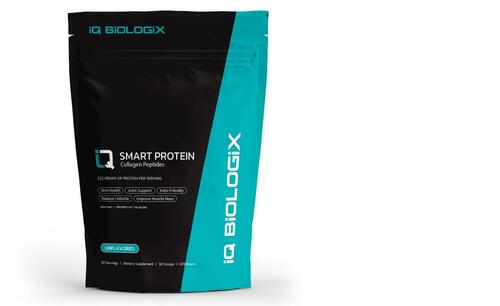Authored by Zena le Roux via The Epoch Times (emphasis ours),
Eating enough protein is essential for preserving muscle. Yet experts say the recommended dietary allowance (RDA) for protein does not reflect the amount required for optimal muscle health. This has important implications for healthy weight loss.
To thrive—not just survive—you may need much more.

Bare Minimum
“The recommended daily allowance (RDA) for protein is the minimum amount needed to prevent deficiency, not the optimal level for health,” Angel Planells, a registered dietitian, told The Epoch Times.
Dietary guidelines suggest that adults eat 0.8 gram of protein per kilogram of body weight per day.
However, protein requirements in the United States have not been reassessed since 2005. Some studies suggest that protein recommendations should exceed the RDA for certain adults, including seniors, active people, and those with chronic conditions like obesity or Type 2 diabetes, Kristen Smith, a registered dietitian nutritionist and spokesperson for the Academy of Nutrition and Dietetics, told The Epoch Times.
Research shows that consuming protein beyond the RDA can optimize health outcomes, particularly for older adults, by helping prevent muscle loss (sarcopenia), supporting muscle maintenance and weight management, and enhancing feelings of fullness (satiety).
Benefits of Eating Enough Protein
Adequate protein intake is crucial for maintaining and building muscle and supporting physical strength and metabolic health. Over time, consistent protein consumption improves body composition by promoting fat loss while preserving lean muscle mass.
Skeletal muscle mass is also a key marker of metabolic health. Increasing evidence shows that greater muscle mass and strength are associated with better health, a longer lifespan, and reduced disease risk.
Muscle reduces the risk of chronic diseases such as Type 2 diabetes and cardiovascular conditions, Dr. Gabrielle Lyon, a family physician, muscle expert, and best-selling author, told The Epoch Times.
For those losing weight, protein intake is essential to prevent unintentional muscle loss. Ideally, weight loss should primarily come from fat stores since fat is a major contributor to metabolic disease. However, muscle mass—especially skeletal muscle—is often lost during weight loss. In fact, 20 percent to 40 percent of total body weight loss can come from muscle, which can negatively affect both short- and long-term health.
* * *
Flash Sale: 25% Off IQ Biologix Fortified Protein!

* * *
Besides maintaining muscle, protein also helps reduce appetite and supports weight loss. High-protein diets (HPD), consisting of 20 percent to 35 percent of calories from protein or 1.2 to 1.9 grams per kilogram of body weight per day—are effective in reducing appetite and preventing weight regain. A 100-kilogram (220-pound) man would need between 120 grams and 190 grams of protein a day. For reference, a single chicken breast contains about 50 grams of protein.
Protein increases hormones that promote feelings of fullness while lowering ghrelin, the hormone that triggers hunger. This leads to a greater feeling of fullness and reduced food intake. Additionally, protein has a higher thermic effect, meaning it requires more energy to digest and process compared to carbohydrates and fats—a key advantage for weight control.
How Much Do We Need?
A general guideline for protein intake is about 1 gram per pound of ideal body weight, or roughly 1.6 to 2.2 grams per kilogram. This amount is sufficient for most people, but individual needs vary depending on factors like age, activity level, health status, and specific goals, according to Lyon.
In addition to athletes and older adults, pregnant women, those recovering from illness, and people managing chronic conditions also have increased protein needs to meet their metabolic demands. This underscores the importance of personalized dietary strategies rather than relying on blanket recommendations, Lyon added.
Long-term protein consumption of 2 grams per kilogram of body weight per day is safe for healthy adults. For highly active people, the tolerable upper limit increases to 3.5 grams per kilogram per day, Stacy Sims, an exercise physiologist and nutrition scientist with a doctorate in environmental exercise physiology and sports nutrition, told The Epoch Times.
As people age—particularly when women reach menopause and men approach their 60s—the body becomes less responsive to the effects of both exercise and protein intake on building muscle. To counteract this resistance, people in these age groups should aim for protein intake at the upper end of the recommended range, Sims added.
Debunking Protein Myths
One common concern is that high-protein diets may harm the kidneys. However, this myth has been debunked. Studies on HPD in obese adults and data from the Nurses’ Health Study have found no decline in renal function.
While some hypothesize that HPD increases fracture risk due to a higher acid load, a meta-analysis of 74 randomized controlled trials found no significant difference in bone mineral density between HPDs (16 percent to 45 percent of daily energy from protein) and low-protein diets (5 percent to 23 percent). However, the study didn’t directly assess fracture risk.
Moreover, low protein intake is linked to osteoporosis in older adults. Research, including the Framingham Osteoporosis Study, suggests that higher protein intake may prevent bone loss in this group.
Another misconception is that plant-based proteins are nutritionally equivalent to animal-based proteins. While plant proteins can be a part of a healthy diet, they often lack one or more essential amino acids and require higher quantities to match the effectiveness of animal proteins in building muscle, Lyon said.
Meet Your Protein Needs
Lyon shared the following meal plan example that includes balanced protein intake for a woman with an ideal weight of 120 to 150 pounds:
- Breakfast: 2 large eggs cooked with 3 ounces of lean ground turkey (33 grams of protein)
- Lunch: 5 ounces of grilled chicken breast, 1 cup steamed broccoli, and 1/2 cup cooked quinoa (40 grams of protein)
- Snack: 1 cup of plain Greek yogurt topped with 1 tablespoon of chia seeds and a handful of berries (22 grams of protein)
- Dinner: 6 ounces of baked salmon with 1 cup of sautéed spinach and 1 medium baked sweet potato (40 grams of protein)
Lyon explained that many people underestimate their daily protein needs and fail to prioritize protein-rich foods in their meals. Additionally, modern dietary patterns tend to favor carbohydrates and fats over protein, partly due to convenience and food availability.